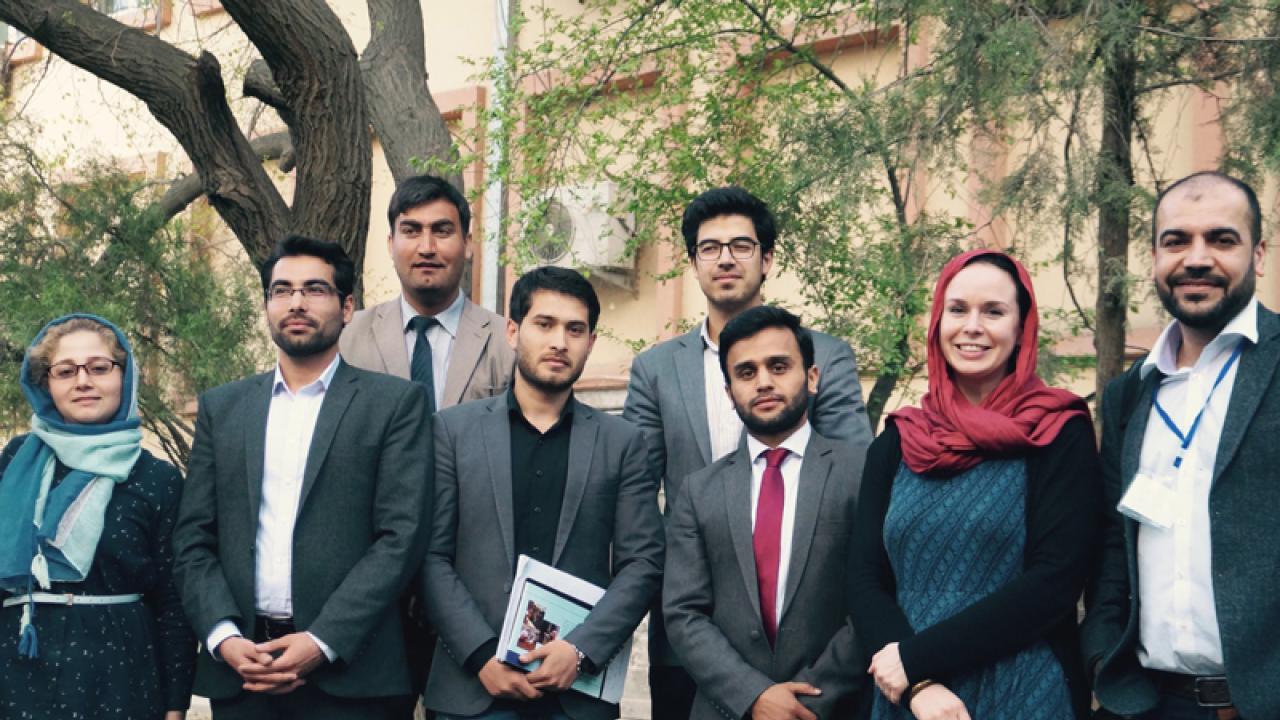
ICTP’s Physics Without Frontiers programme has visited many places in the world, many multiple times as they gradually build communities and networks of scientists. But this past month was the first time the programme visited Afghanistan, meeting with over 400 eager students in Kabul at Kabul University. An international team of PWF scientists collaborated with local scientists and students to organize two days of a high-level workshop in particle physics and cosmology, with a third day of outreach activities.
“We don’t have high energy physicists yet,” says Baktash Amini, ICTP PWF Afghanistan Coordinator and a lecturer at Kabul University in the faculty of physics. “We lost our middle generation because of conflict, and the older scientists are retiring. The younger scientists are hungry for this type of workshop.”
That hunger for knowledge was apparent in Kabul when workshop organizers received hundreds of requests for participation. For the first event in Afghanistan, the organizers did not want to say no to anyone who was interested. They designed this PWF program as a two-day workshop, allowing students to interact with all of the presenters. Students of physics and recent graduates from throughout country were eligible to attend this workshop, but most of the 300 attendees were from the University of Kabul. Security and travel were issues for everyone; UNESCO provided essential help in setting up and running the workshop in the current reality, but it was difficult for students from other universities around Afghanistan to travel to Kabul even though they were interested. The University of Kabul administration was interested as well; its chancellor was on hand to welcome the students to the workshop, and institutional support was extensive with several heads of academic departments attending.
The team organizing the Kabul workshop came together when multiple scientists found they were all interested in the same goal: helping science spread and flourish in Afghanistan and the surrounding region. Amini was in touch with researchers in Kathmandu, Nepal, who had helped organize PWF events there before. PWF head and Sussex University physicist Kate Shaw had met Iranian physicist Enciah Erfani at the World Science Forum in Jordan in 2017, where they found they had similar ideas for workshops in the region.
Erfani is now a professor, but she is also a former ICTP Diploma student, familiar with ICTP and its mission. She discussed setting up a workshop or event in Kabul with Shaw, focusing on their respective fields in high energy physics. In Kabul, Shaw lectured on in particle physics and her work as part of the ATLAS experiment team at CERN, and Erfani lectured on cosmology and her work at the Institute for Advanced Studies in Basic Sciences in Zanjan, Iran. The organizing team wanted to do something big for the first event, a high-level workshop that mimicked a concentrated professional workshop. “Erfani was amazing,” Shaw remembers. “She would lecture on cosmology and then translate my lectures from English to Dari for the participants. She didn’t take a break.”
Two other lecturers from Kabul University were both local organizers for the Kabul PWF workshop, Jawad Ahmadi and Sajad Nazari. "It was one of the most well-organized events that we have done, the local organizers and students helped to make everything run very smoothly," said Shaw. The third day of this event featured a panel with the faculty of the University of Kabul in the morning, with a showcase in the afternoon of devices and robots created by young students, out of whatever spare parts and materials they could find. "The projects were amazing," Shaw and Amini agreed, "the students were very creative."
Feedback from the workshop participants was very positive; there were many requests for more workshops of this type, in fields such as quantum mechanics, string theory, and computing tools for physicists. Afghanistan's Ministry of Higher Education is working hard to revive the research culture in the country, and has had some success. University enrollment doubled between 2011 and 2014, as did the number of faculty members at Afghan universities, according to the 2015 UNESCO Science Report. The World Bank's Strengthening Higher Education Program is helping the country increase the number of faculty members with master's degrees or PhDs, a program that Amini is currently benefitting from.
There are still many challenges however, including stiff cultural barriers for women studying. Of the students enrolled in universities in Afghanistan, the percentage who were female remained level at 20% in both 2010 and 2014. The country has one of the lowest literacy rates in the world, with 31% of the population literate, 45% of men and 17% of women. A lack of equipment and resources is also a stark issue: in 2013, there were no functioning physics labs for students at the University of Kabul. For this workshop, though, the gender ratio among participants was nearly equivalent; fifty-five percent were male and forty-five percent were women.
With luck, those workshops and others like them will continue to support the growth of physics in Afghanistan. Amini hopes to develop a network among Afghan universities, to develop collaborations and connections among scientists and pass on opportunities. Other ideas for the future include remotely taught courses, new equipment, and the establishment of a master’s degree programme in physics at the University of Kabul. This workshop was a great start.
--- Kelsey Calhoun
















